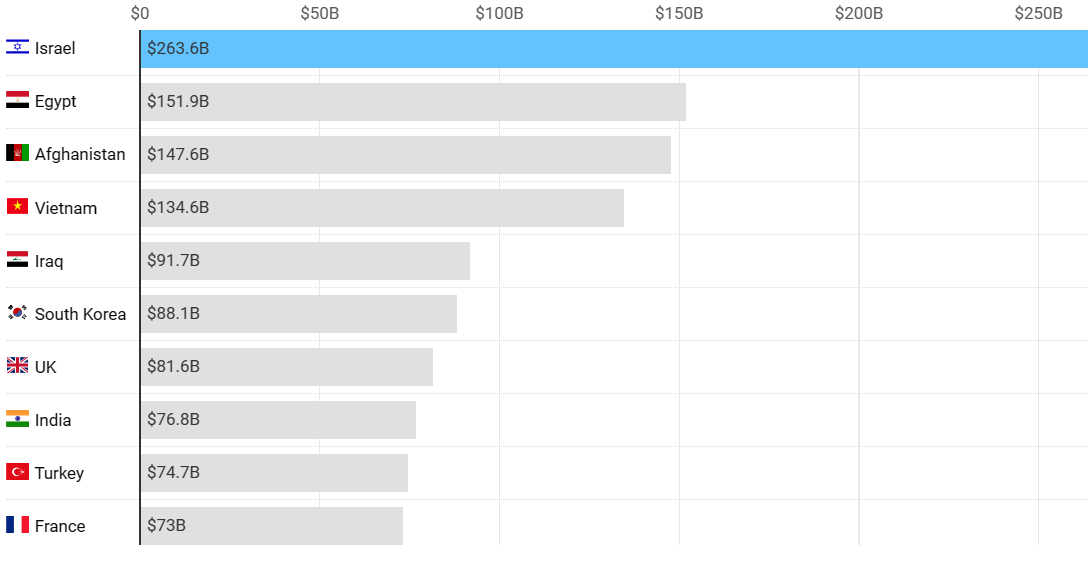Intelligence assessment: Military capabilities of the Israeli army vs. Hamas
According to The Military Balance 2023 by the International Institute for Strategic
Studies (IISS), Israel has 169,500 active military personnel in its army, navy and
paramilitary forces.
Crucially, another 465,000 make up its reserve forces. This is an army
equipped to fight with considerable intensity, and in wartime conditions its size
can reach into the hundreds of thousands.
In 2021, the Times of Israel quoted a senior Israeli commander, who wished
to remain anonymous, as saying that Hamas had an army of only 30,000 men.
There is a considerable difference between the personnel of the IDF and
Hamas.
What advantages does Hamas have?
Despite the technical challenges, Hamas has been able to capitalize on a number of
key factors.
First, cost asymmetry is an obvious issue, especially with regard to rocket
attacks. The cost of intercepting a single rocket can be as high as $80,000 to
$100,000, which is quite high for Israel. However, it costs far less for Hamas to
fire a rocket, so they can easily afford to lose it.
Over the years, Israel's air and missile defense systems have been under
increasing threat. So this poses a challenge.
The second key factor in Hamas' favor is also one that they can exploit, the
human terrain of Gaza.
Hamas has skillfully forced the IDF to engage them in an urban environment,
a strip of land that is rich in underground infrastructure and carefully excavated
hideouts, making it difficult for even a fairly capable modern army to root out a
relatively primitive opponent.
While this is clearly a huge asymmetry in terms of specific capabilities,
Hamas appears to be attempting to capitalize on certain advantages of geography and
cost.
Overview of the Israeli military
Israel has a large military force, with a total of 169,500 active military personnel
in the army, navy, and paramilitary forces, according to the 2023 International
Institute for Strategic Studies (IISS) Military Balance Report. In addition, there
are 465,000 as its reserve force, while 8,000 are part of its paramilitary forces.
Military service is mandatory for citizens over the age of 18 and once
enlisted, men are expected to serve for 32 months and women for 24 months.
Israel has one of the strongest armies in the Middle East, with advanced
surveillance and weaponry.
See below for an overview of the Israeli military.
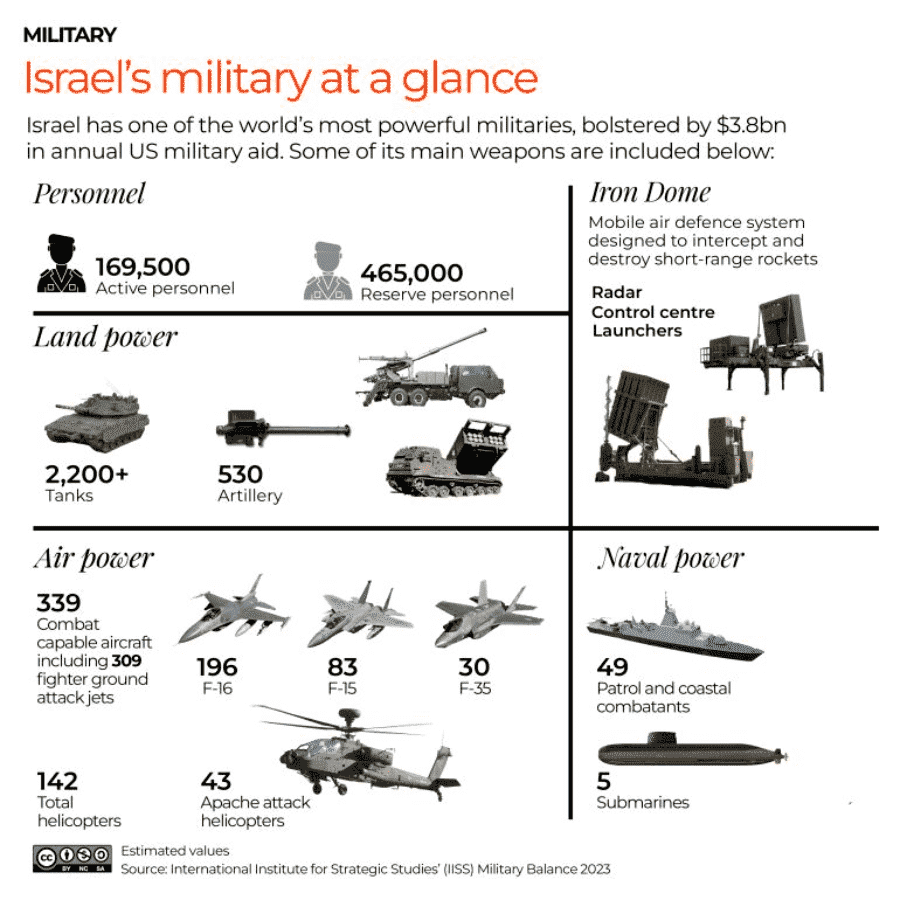
Israel's Iron Dome system is an enigmatic mobile air defense system whose primary
mission is to intercept and destroy incoming short-range rockets using advanced
radar technology. In that 2006 war, Israel suffered a barrage of thousands of
rockets. And Iron Dome, like a guardian, carried the hopes of the Israelis to
counter the rocket attacks.
Iron Dome became operational in 2011, created with the help of the United States,
which is responsible for supplying parts for the system, including more than $1.6
billion set aside for Israel's missile defense system in 2022.
According to the International Institute for Strategic Studies (IISS),
Israel's Iron Dome system intercepted more than 90 percent of the rockets fired by
Hamas and other Palestinian groups in 2021.
Israel is also believed to have nuclear capabilities, according to the IISS, which
notes that the country possesses Jericho missiles and aircraft capable of carrying
nuclear warheads.
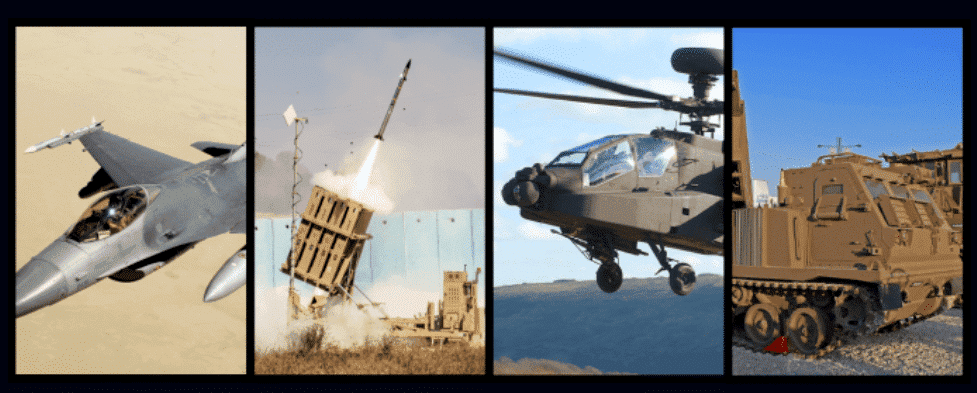
How much does Israel spend on its military?
In 2022, Israel spent $23.4 billion on its military, according to the Stockholm
International Peace Research Institute (SIPRI), a research institute focused on
conflict and armaments.
This equates to $2,535 per capita for the period 2018-2022, making it the
world's second-largest per capita military spender after Qatar.
In 2022, Israel will spend 4.5% of its Gross Domestic Product (GDP) on its
military, the 10th highest percentage in the world.
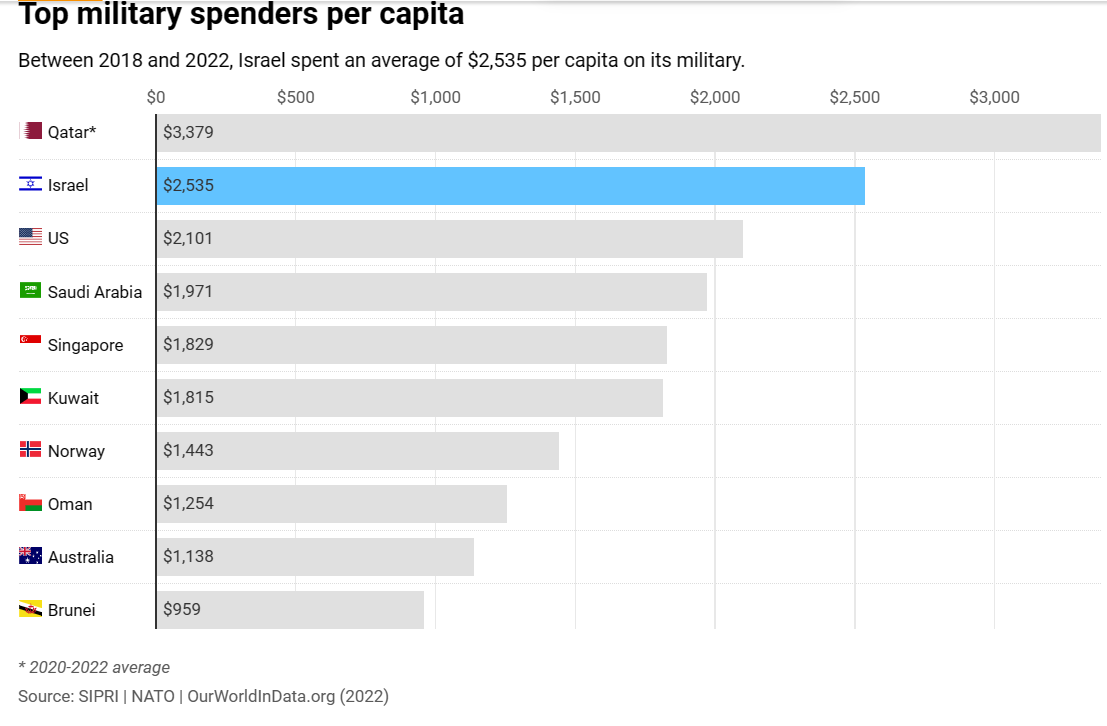
Which countries buy the most Israeli weapons?
Historically, Israel's arms imports have far exceeded its exports.
However,
SIPRI data shows that over the past decade, exports have begun to consistently
outpace imports.
Between 2018 and 2022, at least 35 countries imported weapons from Israel,
totaling $3.2 billion.
Of these, about a third ($1.2 billion) of Israel's military exports are to
India. Relations between Israel and India have flourished since Indian Prime
Minister Narendra came to power in 2014.
The second largest buyer of Israeli weapons is Azerbaijan, followed by the Philippines, the United States and Vietnam.
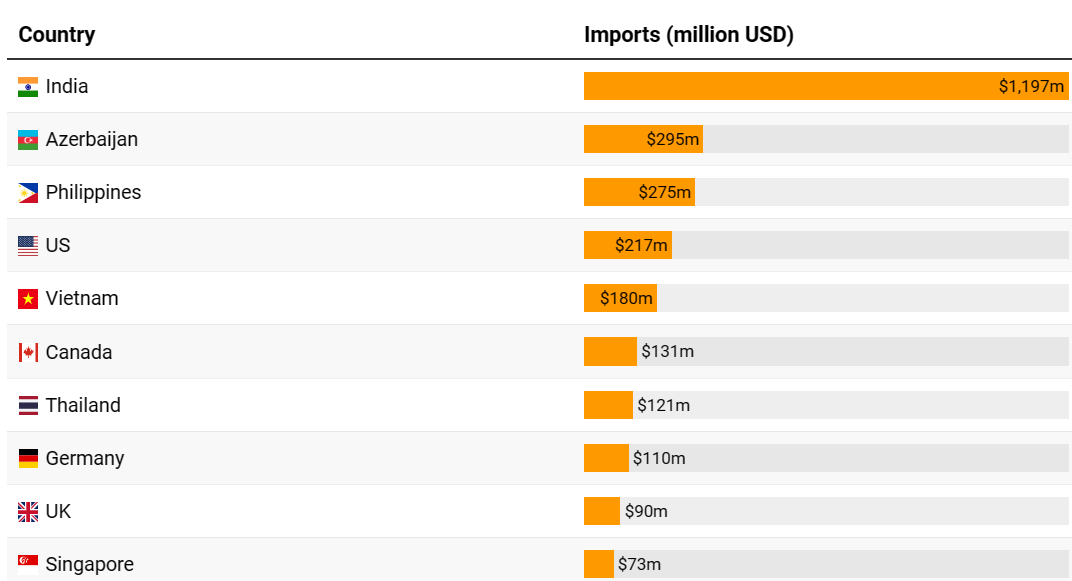
Between 2018 and 2022, Israel imported a total of $2.7 billion in arms from just two
countries, the United States and Germany.
More than three-quarters of Israel's $2.1 billion in military imports come
from the United States, with the remaining $546 million coming from Germany.
The U.S. and Israeli militaries work closely together on joint exercises,
technology development programs, and defense projects, with the latter being the
largest recipient of U.S. military aid.
How much military aid does Israel receive from the United States?
Israel is the largest recipient of U.S. foreign aid, receiving about $263 billion
between 1946 and 2023.
This is almost twice as much as the second largest recipient of U.S. foreign
aid, Egypt (1.7 times), which has received $151.9 billion over the past 77 years.
Ten countries have received about half of all U.S. foreign aid since World
War II, and from 1946 through 2023, Israel received about $264 billion in foreign
aid from the United States.
